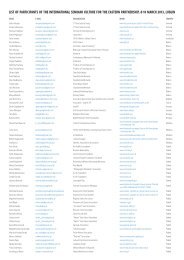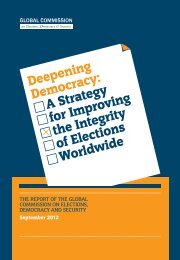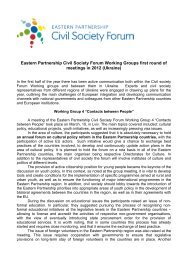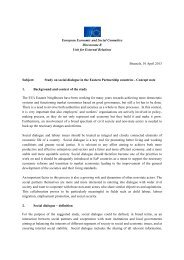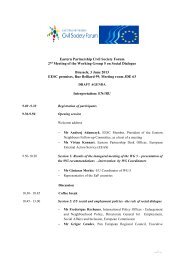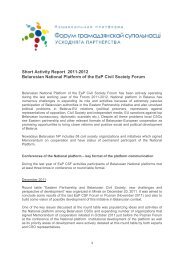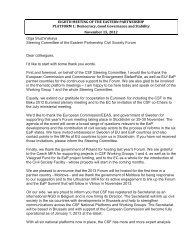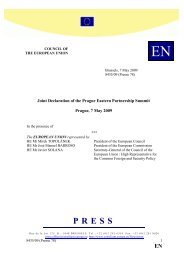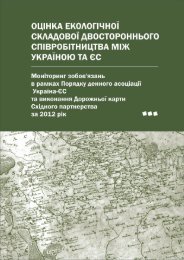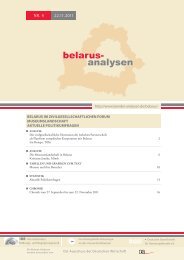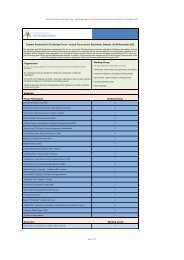Non-formal education - Eastern Partnership Civil Society Forum
Non-formal education - Eastern Partnership Civil Society Forum
Non-formal education - Eastern Partnership Civil Society Forum
Create successful ePaper yourself
Turn your PDF publications into a flip-book with our unique Google optimized e-Paper software.
The below list shows priority professional training topics/courses:<br />
SEWING<br />
FELT/TAPESTRY<br />
WOOD CARVING<br />
SOUVENIRS PRODUCTION<br />
KNITTING/EMBROIDERING<br />
HAIR DRESSING<br />
COSMETOLOGY<br />
AGRICULTURE<br />
CULINARY<br />
PAINTING/PLASTERING/<br />
PLUMBERING<br />
TOURISM/TOUR GUIDE<br />
REPAIREMENT OF<br />
HOUSEHOLD APPLIANCES<br />
CAR REPAIRING<br />
CAR DRIVING AND<br />
DISTRIBUTION<br />
SHOE MAKING AND<br />
REPAIRING<br />
COMPUTER REPAIRING/<br />
PROGRAMMING<br />
An average duration of courses range from 1 month to a year and a half and the fees – vary<br />
from GEL 10 to GEL 1000 (EUR 5-500), however there are providers offering free classes for socially<br />
unprotected people, IDPs and refugees and youth.<br />
As an example of successfully functioning non-<strong>formal</strong> <strong>education</strong> institutions which implement many<br />
types of above mentioned <strong>education</strong> programs the case of Georgian Adult Education/Community<br />
Education centres might be described. These centers were established in3 regions of Georgia by the<br />
German organization dvv international in 2006-2009 with the financial support of the EU and German<br />
government. All the centres were established in the regions with specific challenges: poor infrastructure,<br />
socially disadvantaged overall atmosphere, lack of possibilities for further <strong>education</strong>, multinational<br />
environment, resettlement of internally displaced persons, etc. Primarily programmes by the centres<br />
were focused on problems of the maqin target groups: national minorities and IDPs.<br />
The Centres started functioning with few courses based on the requirements of the targeted population.<br />
Gradually the CECs expanded its scope of activities providing numerous free vocational and personal<br />
development training programmes, youth and social initiatives, capacity building and awareness raising<br />
projects thus assuring their inevitable presence and recognized place among the beneficiaries. The Centres<br />
managed to maintain an extinguished position through needs-based and innovative study programmes,<br />
open and equal, friendly and truthful atmosphere created against the previous prejudice, reluctance and<br />
mistrust of population who lack awareness on non-<strong>formal</strong> and adult <strong>education</strong> programmes and did not<br />
believe in power or learning and knowledge. Quite soon increased motivation of IDPs, national minorities<br />
and the rest of community to involve in the activities offered at the CECs also emphasized the significance<br />
and effectiveness of the project. Acquired skills and knowledge was a strong support to beneficiaries to<br />
develop further, find employment and become active members of society.<br />
Knowledge and skills acquired as a result of the vocational and personal development courses was<br />
a strong support for the graduates to develop their competence and create opportunities for employment<br />
or self-employment. Beyond the professional benefit the major impact the entire training programme<br />
had on the beneficiaries was the unique possibility to realize themselves, regain self-esteem and<br />
confidence, overcome stress and despair and promote interaction and integration.<br />
In addition to the tailor-made training programmes dvv international organized a wide range of<br />
sessions to complement the <strong>education</strong>al component and promote awareness of the targeted population<br />
of general issues of their concern. The initiatives aimed to meet the need among targeted communities<br />
to improve their knowledge, to have free access to the information and get better understanding on<br />
specific issues through public lectures, talks and discussions. The topics of the lectures covered politics,<br />
economics, arts, culture, public diplomacy, ecology and many other issues of common interest.<br />
The course in life-skills covered the sessions on Leadership; Communication and Presentation<br />
Skills; Conflict Management, Problem Solution, Tolerance, Citizenship and Democracy, Team building,<br />
Proposal writing, NGO formation and management, Strategic planning and Fund-rising. Those were the<br />
main topics, increased awareness on which supported to the acknowledged function of the beneficiaries<br />
among the society, active participation and full membership in the community life.<br />
The centres become a strong incentive for the entire community, and particularly for women (socially<br />
vulnerable, single mothers, handicapped, having large families) to overcome stress and despair and<br />
61



